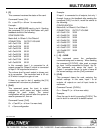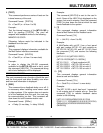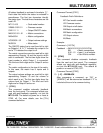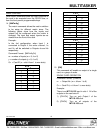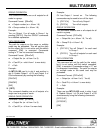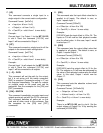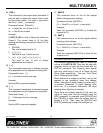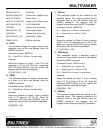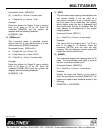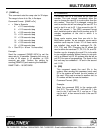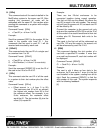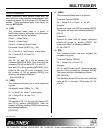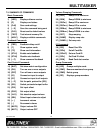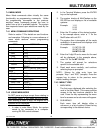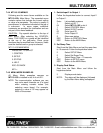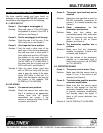
MULTITASKER
400-0197-006
17
Command Format: [RDNmCn]
Cn = Card ID (n = # from 1 to max slots)
m = Output No. (n = # from 1 to 8)
Example:
Ramp the volume for Output 8 from a starting
level of 32 down to 00 for C4. Send the
command [RDN8C4] and the system will
respond with the following feedback:
[31][30][29]…[00]
34. [RDNm=xx]
This command ramps a specified output’s
volume down to a user defined level at a rate
defined using the [RAMP] command.
Command Format: [RDN=xxCn]
m = Output No. (xx = # from 1-8)
xx = Stop Level (xx = # from 00-32)
Cn = Card ID (n = # from 1 to max slots)
Example:
Ramp the volume for Output 8 from a starting
level of 32 down to 16 for C4. Send the
command [RDN8=16C4] and the system will
respond with the following feedback:
[31][30][29]…[16]
35. [RST]
This command stops ramping and maintains the
last volume setting. It can be used as a
stand-alone command, or as a volume key on
the front panel. As a volume key, the ramping
action begins when the key is depressed and
then stops when the key is released. See the
code sample at the beginning of the volume
ramping section.
Command Format: [RSTCn]
Cn = Card ID (n = # from 1 to max slots)
Example:
The card in slot 4 is ramping from 1 to 32 at a
rate of 32 steps in 18 seconds. Send the
command [RSTC8] and the card will stop
ramping. The last displayed volume setting will
remain the current volume level.
36. [RAMP]
This command displays the ramping time for 32
steps. The time between each step is equal to
the time in seconds divided by 32.
Command Format: [RAMPCn]
Cn = Card ID (n = # from 1 to max slots)
Example:
Display the ramp rate setting for the card in
slot 4 by sending the command [RAMPC4]. The
system will respond with feedback similar to the
following:
RAMPTIME = 6 SECONDS



